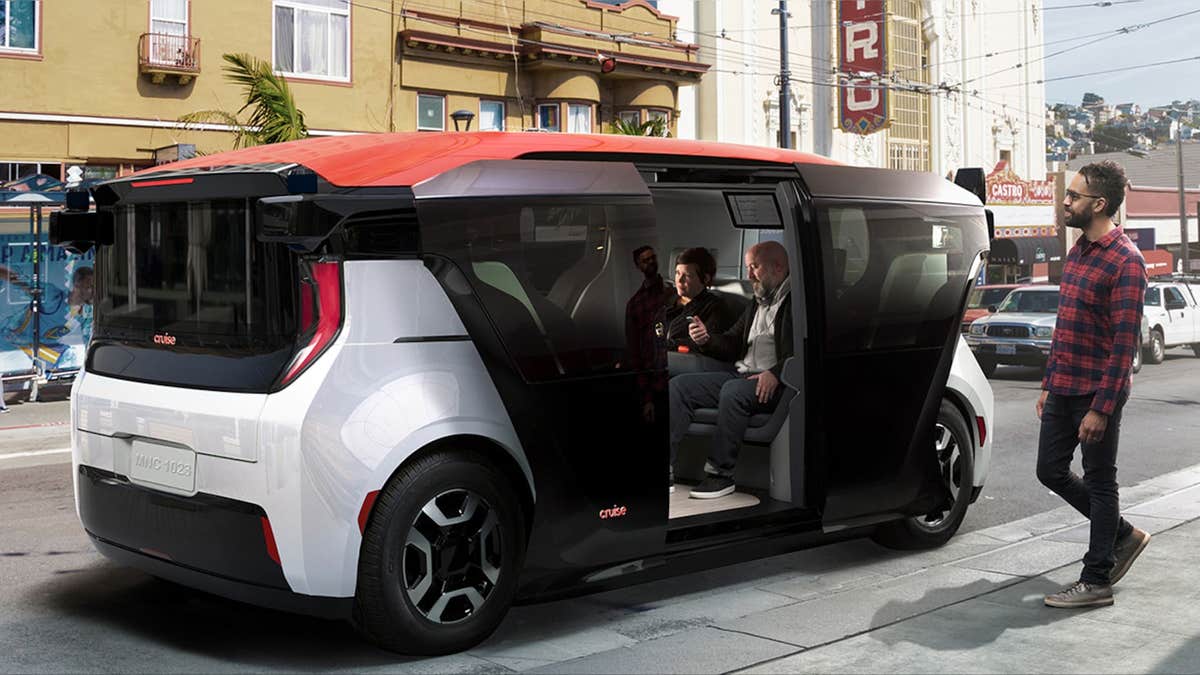Hands-off with Cadillac's Super Cruise
The 2021 Cadillac Escalade is available with the latest version of GM's hands-free Super Cruise highway driving aid. Fox News Autos Editor Gary Gastelu lets it take him for a ride.
General Motors is developing autonomous vehicles through its Cruise division, which is already testing the vehicles on the streets of San Francisco without a driver behind the wheel, but you won't be able to buy one.
The vehicles are intended for use in a ride-hailing service the company is hoping to launch in select cities soon, including Dubai where it recently signed a deal to become the city's exclusive self-driving taxi service.

The Cruise Origin is a fully autonomous electric taxi GM plans to begin producing soon. (Cruise)
For now, GM's retail customers have to settle for the Super Cruise driver-assist system, which is currently available on the Cadillac Escalade and Bolt EUV and will be offered on 22 models by the end of 2023.
Super Cruise is currently capable of driving a vehicle within a lane on a pre-mapped highway and changing lanes in traffic when the driver hits the turn signal, but the driver has to keep their eyes on the road and be ready to take over at a second's notice in case of emergency. Facial recognition technology ensures that they do.
FOX NEWS CAR REVIEWS: 2021 CADILLAC ESCALADE WITH SUPER CRUISE
Additional features will be added as the software is developed, and GM CEO Mary Barra said during the company's first-quarter 2021 earnings call that "our ultimate vision is that this system enables hands-free transportation in 95% of driving scenario."
That's in part because it is lacking some of the sensors used by the more robust Cruise system, including costly lidar scanners, which most autonomous systems rely on.
FOX NEWS CAR REVIEWS: 2021 CHEVROLET BOLT EUV
That doesn't include Tesla's Full Self-Driving, which aims to become fully autonomous using only cameras without the support of lidar or even radar. The feature is still in development and, while CEO Elon Musk has often suggested that full autonomous capability is on the near horizon, Tesla recently cautioned in a filing with the SEC that "there is no guarantee that any incremental changes in the specific equipment we deploy in our vehicles over time will not result in initial functional disparities from prior iterations or will perform as expected in the timeframe we anticipate, or at all."
EXCLUSIVE: GM PRESIDENT MARK REUSS TALKS ELECTRIC CARS IN ‘THE FOX GARAGE’
It's a requisite cautionary statement, but Musk said that the artificial intelligence required is "one of the hardest technical problems" that has ever existed.
CLICK HERE TO GET THE FOX NEWS APP
Cruise is tackling it as well, and Barra is optimistic that its system could trickle down to GM's retail models by 2030.
"You know, later in the decade, I believe, there's a lot to still unfold, but I believe we'll have personal autonomous vehicles and then that will leverage the capability we have at Cruise with the capability that we have a car company to really be well-positioned to delight the customers from that perspective,' Barra said.
